- Shop Now
- Burncoose Specialities
- This Month
- Offers & Promotions
- RHS Chelsea Flower Show 2024
- 40 years at Burncoose
- Engage With Us
- Information, Help & Advice
- About Us & Our Services
- Terms & Conditions
- Log In / Register
SALVIA
Commonly known as Sage
In the mint family. Very large genus of about 900 species of annuals, biennials, herbaceous and evergreen perennials and shrubs distributed generally in temperate and tropical regions.
They are frequently aromatic, hairy or woolly and many species attract bees. Some have medicinal and culinary qualities.
Clary (clear-eye) sage, S. verbenaca and S. pratensis are the UK natives. Seeds of the former, from dry pastures and roadsides in southern England, were made in to a mucilage and used to soothe eye irritation, roots were ground as snuff and leaves used as a herb with lemon or orange juice. The latter, meadow clary, has a status of Vulnerable and Near Threatened because of the manufacture of "improved grassland". It is found on calcareous grassland in southern England.
Less hardy varieties can be grown in containers.
-
Evergreen
-
Herb
-
HerbaceousEarly in the year, typically January till end of March, herbaceous plants might be supplied in 9cm pots to ensure timely despatch.
-
Medium shrubTypically grow to around 4-6 feet in height
-
Additional Features
 Good to knowWildlife plant. Very attractive to bees and butterflies. Used for culinary purposes (S. officinalis)
Good to knowWildlife plant. Very attractive to bees and butterflies. Used for culinary purposes (S. officinalis) Medicinal propertiesS. officinalis (common sage) - a history of use in medicine
Medicinal propertiesS. officinalis (common sage) - a history of use in medicine Place of originWorldwide distribution in temperate and tropical regions.Resistant to honey fungusThese plants have little or few problems with honey fungus.
Place of originWorldwide distribution in temperate and tropical regions.Resistant to honey fungusThese plants have little or few problems with honey fungus. -
Wildlife
 Bee friendly
Bee friendly
- Dividing Herbaceous Perennials - Video Tip ondemand_video
- Spring Planting Osteospermums - Video Tip ondemand_video
- Dividing Summer Perennials - Video Tip ondemand_video
- Dividing summer flowering Hemerocallis - Video Tip ondemand_video
- Summer propagation - Video Tip ondemand_video
- Self-seeding aquilegia - Video Tip ondemand_video
- Supporting Plants - Video Tip ondemand_video
- Dead heading meconopsis - Video Tip ondemand_video
- Dead heading Delphiniums - Video Tip ondemand_video
- Feeding herbaceous peonies - Video Tip ondemand_video
- Overpotting Problems - Video Tip ondemand_video
- Allergic reactions and pollen
- Plants which produce masses of pollen - to avoid
- Plants producing little pollen - relatively safe!













ACHILLEA 'Inca Gold'

AGASTACHE mexicana 'Red Fortune'

ALLIUM giganteum

BALLOTA pseudodictamnus
CANNA 'Lucifer'

CROCOSMIA 'Lucifer'

GAURA lindheimeri 'The Bride'

HAKONECHLOA macra 'All Gold'

HELENIUM 'Moerheim Beauty'

HELENIUM 'Ruby Tuesday'

PEROVSKIA atriplicifolia 'Blue Spire'

PERSICARIA microcephala 'Red Dragon'

PHLOMIS russeliana

VERONICA
Buy Varieties of SALVIA

SALVIA africana-lutea
(syn. S. aurea) - In mild climates this extraordinary species forms a medium sized perennial shrub. It has large bright yellow clawlike flowers which quickly turn a rusty-brown. One of those plants which makes you stop in your tracks to wonder what it is!
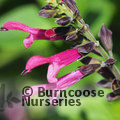
SALVIA 'Amante'
pink flowers from purple calyces

SALVIA 'Amethyst Lips'
small purple flowers, white at the base.

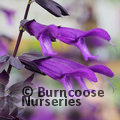
SALVIA 'Amistad'
purple flowers from deep purple calyces


SALVIA argentea
rosettes of silver furry leaves with spikes of soft pink white flowers
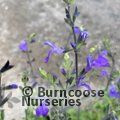
SALVIA 'Blue Note'
(syn. S. greggii 'Blue Note') - small true-blue flowers

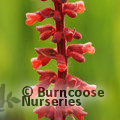
SALVIA confertiflora
woody-based perennial with long spikes of orange-red flowers in summer. Frost tender
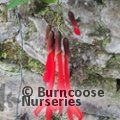
SALVIA dombeyi
brilliant red flowers up to 5 metres long. Our plants flower in late autumn

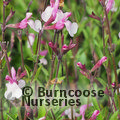
SALVIA 'Dyson's Joy'
a bicoloured variety with white tinged pink flowers before a pinkish-red calyx
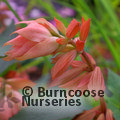
SALVIA 'Embers Wish'
coppery yellow in bud opening to an intense red.
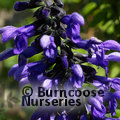
SALVIA guaranitica 'Black and Blue'
purple-blue flowers with near-black calyces. Vigorous

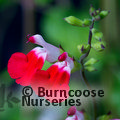
SALVIA x jamensis 'Hot Lips'
two-tone red and white flowers. Bushy perennial

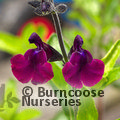
SALVIA x jamensis 'Nachtvlinder'
rich purple. Hardy
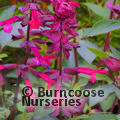
SALVIA 'Love and Wishes'
popular runner up in RHS plant of the year 2015 with purple-pink flowers


SALVIA microphylla 'Cerro Potosi'
small magenta-pink flowers
Useful extras...








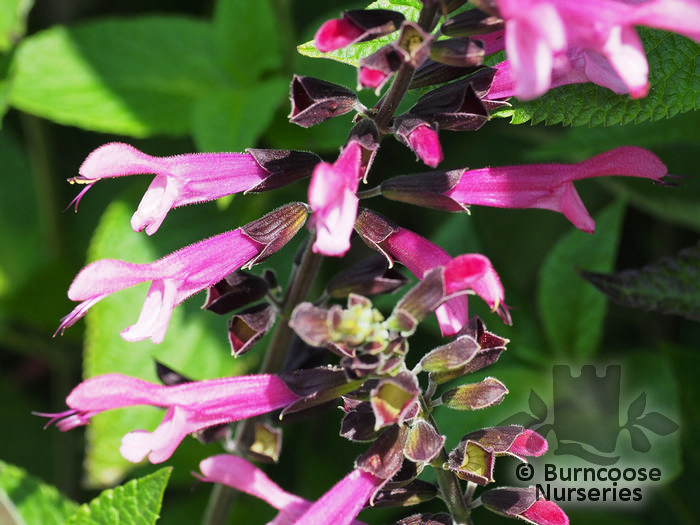


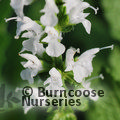





 Gift-wrapping available
Gift-wrapping available




